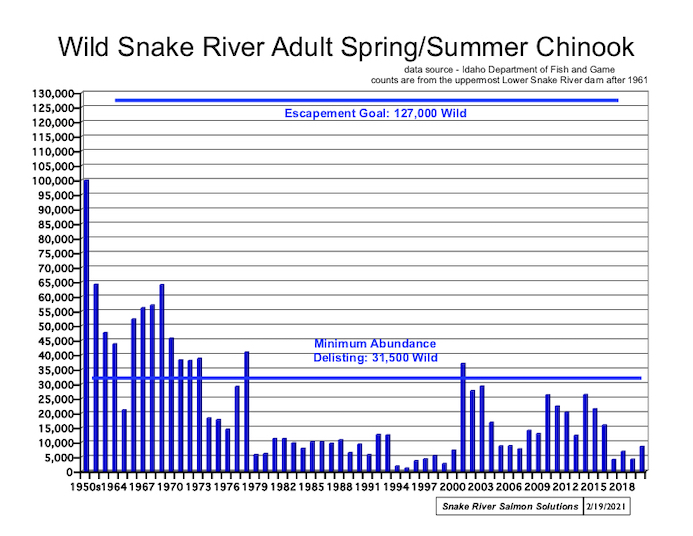forum
library
tutorial
contact

GOP Radicals Failed to Get Their Way
-- This Time
by Marty Trillhasse
Lewiston Tribune, January 13, 2022
|
the film forum library tutorial contact |

|
GOP Radicals Failed to Get Their Way
by Marty Trillhasse
|
A vote of "no confidence" in Congressman Simpson
after he proposed breaching the four lower Snake River dams
 The radical fringe that controls much of Idaho's Republican Party already dictates who can -- and who cannot -- vote in the all-important GOP primary.
The radical fringe that controls much of Idaho's Republican Party already dictates who can -- and who cannot -- vote in the all-important GOP primary.
Now they want to decide who can -- and who cannot -- run for office as a Republican in that same GOP primary.
Here's betting their failed attempt on Friday is only the beginning. How many second chances do you want to give them?
With the exception of the Kootenai County GOP, few elements of the Idaho Republican Party are more focused on waging a purity contest than the Bonneville County central committee. It has little use for establishment Republicans, whether it's Congressman Mike Simpson or Gov. Brad Little.
Last year, its leadership concocted a plan to give local central committees the right to block candidates for county and legislative office from the GOP primary ballot.
Their plan would give the state GOP leadership the power to do the same for the U.S. House, U.S. Senate, governor, lieutenant governor, attorney general, secretary of state, state treasurer, superintendent of public instruction and controller.
Bonneville County GOP state committeeman Doyle Beck of Idaho Falls, one of the architects of this scheme, blamed nefarious Democrats running as Republicans and left-leaning Democrats voting in the GOP primary.
"This unethical practice is now promoted by our faithful (Republicans in name only)," Beck told the Idaho State Journal of Pocatello.
Nonsense. This was a power grab, nothing more, nothing less. Beck's wing of the party typically garners no more than 30% to 40% of the vote. What he wants is a veto over who is elected to public office in this state.
Interestingly, the same state GOP rules committee that issued a vote of "no confidence" in Congressman Simpson after he proposed breaching the four lower Snake River dams entertained the idea and then unanimously rejected it.
That happened after former Idaho GOP Chairman Trent Clark of Soda Springs exposed the plot in his Jan. 1 column in the State Journal:
"Under the rule, no more than two candidates can receive endorsements in each race," Clark wrote. "But it also permits instances where a central committee can endorse only one name, eliminating the mess and fuss of getting input from rank-and-file Republicans all together."
Before you dismiss this as the handiwork of a group of overly partisan insiders, keep in mind that more than a few people dismissed the overly partisan insiders' push to eliminate Idaho's traditional open primary election -- where people were free to vote Republican or Democratic.
Citing their constitutional right of free association, these activists went to court and won the right to demand anyone voting in their primary election register as a loyal Republican -- thereby discouraging Democrats and independents from casting a ballot.
After a decade, that system has swung Idaho's House of Representatives decidedly to the right -- and has given the Idaho Freedom Foundation enormous influence over the Legislature.
With one court victory on their side, they may try again. These party activists can rely on history, too. Before 1970, the Idaho GOP relied on a state convention system to decide who could appear on the Republican primary ballot.
That's still the model in use in Utah, where in 2010, a group of Tea Party insiders ended the career of U.S. Sen. Bob Bennett. With Bennett gone, right-winger Mike Lee had a clear shot at winning the Senate seat.
How long before the wing of the GOP that supports Janice McGeachin and Priscilla Giddings gains enough control to deny people such as Little and House Speaker Scott Bedke of Oakley a line on the ballot?
For the voters who pay for these elections, there is a solution. It's called a top-two primary.
As used in Washington state and elsewhere, it allows voters -- of any political persuasion -- to select two Republicans, two Democrats, two independents or any variation -- to face the voters in the general election. As a rule, the more centrist candidate will prevail in November.
Party insiders hate it, but the courts have upheld the top-two primary system.
So you can choose to upend the disproportionate influence the ideological right wing enjoys in this all-Republican state.
Or you can wait for the next GOP insider power play.
learn more on topics covered in the film
see the video
read the script
learn the songs
discussion forum
